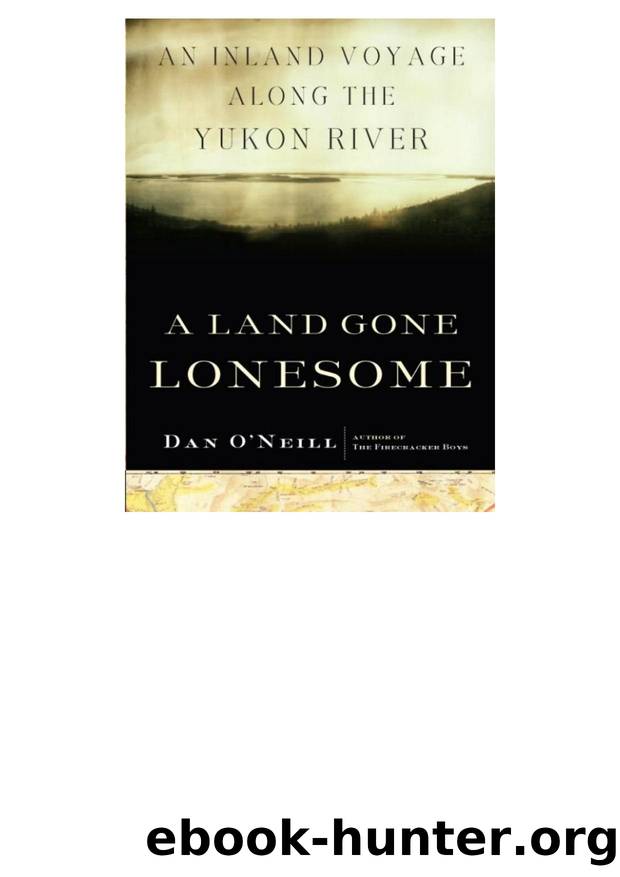A Land Gone Lonesome by Dan O'Neill

Author:Dan O'Neill [O'Neill, Dan]
Language: eng
Format: epub
ISBN: 9780786722129
Publisher: Basic Books
Published: 2011-04-07T05:00:00+00:00
AROUND THE NEXT BEND, the light and the river go steely blue-gray, and the trees darken until they lose all their color. I see a canoe like mine poking slowly upriver near the right bank, and I swing the tiller over and aim for it. Itâs Wayne Hall and his son Garf scouting for moose in the twilight. They are camped nearby in a stand of spruce trees a mile or so above the mouth of the Nation River, and they invite me to join them for the night. I go set up my tent while they check one more slough.
Around the campfire, our talk turns to territoriality. When Wayne established a fish camp at this spot a few years ago, he found that another fisherman about four miles downriver was unhappy about it. The other fellow used to live on the Kandik River: âHe said, âOn the Kandik if someone wanted to camp within ten miles of someone elseâs place, they came and asked permission.ââ Wayne, who lives on the Yukon just a few miles outside the village of Eagle, said he figured Kandik rules were different from Yukon rules because the Yukon was more of a highway than the side creeks. Heâs also at odds with another Kandik River resident, a trapper who prefers to be unnamed. The dispute centers on a cabin a few miles downriver built by Dave Evans. Evans was long gone by the time the man commenced using it as a trapline cabin. Wayneâs case rests on the following argument: the cabin belonged to Evans; Evans used the cabin when trapping; since Wayne has taken over Evansâ trapline, he is also entitled to take over the cabin.
Rivals on the river. Actually, as Wilfred Funk tells us, the word rival comes from river. Through the French to the Latin rivales. It means ânear neighborsâ or âthose who lived on the banks of the same stream.â Rivales were inevitably competitors for fish and the other bounties of riparian life, and that sense informs our modern usage.
Disputes like the ones Wayne Hall describes are not uncommon. When Steve Ulvi lived up near the border, there was an especially productive eddy claimed by a couple of fellows from Eagle who fished it every year. Each year, after they took all the fish they wanted, they let Ulvi use the site. âEventually I started feeling real territorial about the place,â he told me, âespecially when they stopped fishing it and started handing it off to other people who didnât live around there. We kind of had a show-down and I lucked-out and ended up on the spot.â But the primacy-of-proximity principle doesnât always hold, apparently. For instance, there was another right-of-succession case involving Ulvi and Charlie Edwardsâs trapline. Charlie had decided to quit trapping the upper part of Fourth of July Creek. That area had burned in 1969 and was now loaded with marten. And even though he lived fifty or sixty miles upriver, Ulvi and his brother took it over.
Download
This site does not store any files on its server. We only index and link to content provided by other sites. Please contact the content providers to delete copyright contents if any and email us, we'll remove relevant links or contents immediately.
| Excursion Guides |
The River by Peter Heller(2344)
Breath by James Nestor;(2307)
Sea Survival Handbook by Keith Colwell(2242)
Fatal Storm by Rob Mundle(2215)
Deep by James Nestor(2180)
Lonely Planet Australia by Lonely Planet(2080)
Iced In by Chris Turney(2001)
Discover Australia by Lonely Planet(1948)
Lonely Planet Maldives (Travel Guide) by Planet Lonely & Masters Tom(1858)
FOR THE LOVE OF THE SEA by Bohnet Jennifer(1791)
One Girl One Dream by Dekker Laura(1680)
Looking for a Ship by John McPhee(1675)
Ten Degrees of Reckoning: The True Story of a Family's Love and the Will to Survive by Hester Rumberg(1654)
Chicken Soup for the Ocean Lover's Soul by Jack Canfield(1645)
Lonely Planet Australia (Travel Guide) by Lonely Planet & Lonely Planet(1593)
South with the Sun by Lynne Cox(1587)
The Wave In Pursuit of the Rogues, Freaks and Giants of the Ocean(1558)
Diver Down by Michael Ange(1506)
Marlinspike Sailor's Arts and Crafts by Barbara Merry(1488)
